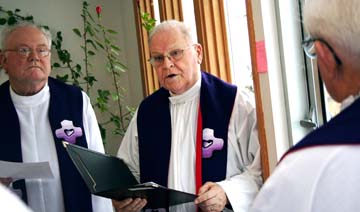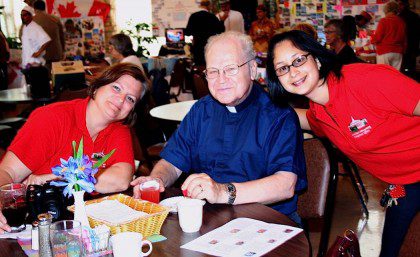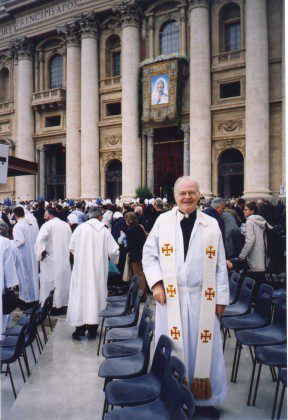
Fr. Michael van der Peet, SCJ, died April 21. He was 85.
Professed in 1946 and ordained in 1953, Fr. Michael once joked that he “joined the family business.”
“Of my mother’s family, there was a brother who was a Trappist Monk, another who became a religious brother and a sister who became a nun,” he continued. “Three of my father’s cousins were SCJs.”
From the time he was a small child Fr. Michael assumed that he would be a priest. When he was 12 he told his father that he wanted to go to the minor seminary. Since one of his father’s cousin’s was the rector of an SCJ seminary, the choice as to where to begin his studies was an easy one. At 13 he entered the SCJ seminary in Bergen op Zoom, Netherlands.
His studies came to an abrupt halt in 1940 when World War II reached Holland. “The seminary was forced to close,” he said.
Fr. Michael returned to his hometown and waited for the seminary to reopen. But the war escalated. In 1944, Dutch men between the ages of 16 and 34 were ordered to report to German munitions factories. Knowing that such work almost meant certain death (the factories were the first targeted by bombers), Fr. Michael spent time in hiding to avoid German troops seeking men for the factories. He talked of dressing as a woman to pass through military checkpoints during a move between “safe houses”
“Actually, I fluffed myself up quite nicely,” he said when remembering the story.
When Holland was liberated Fr. Michael returned to the seminary.
After ordination, Fr. Michael hoped to be a missionary in Chile. But his provincial superior decided that that he could be better used in the United States where the young U.S. Province was in need of seminary instructors.
“I arrived, unable to speak English, on loan to the U.S. Province for five years,” he said. However, the language barrier didn’t last long. After a year at St. Joseph’s Indian School Fr. Michael was at Divine Heart Seminary in Donaldson, Ind., teaching Latin, French and music.
“I really fell in love with the United States,” he said. It wasn’t long before he asked the Dutch provincial superior if he could transfer to the U.S. Province.
“Are you happy there?” he asked me,” said Fr. Michael. “I said ‘yes,’ and then he told me in Latin, ‘Where you feel at home, that is your fatherland.’ I’ve never regretted my decision.”
Fr. Michael said that he lived his first dozen years in the United States as a “hidden priest. I spent all of my time in the seminary; teaching during the week and leading the choir on the weekends. I wasn’t able to get out and help a lot at the parishes. But I was always happy in the seminary.”
A new chapter
In 1964 he attended a retreat similar to the “cursillo” experience. The retreat opened a new chapter in Fr. Michael’s life.

“I was quite vocal during the retreat and at the end the head of the retreat team asked me if I would preach at the last Mass,” he said. “After that Mass we talked; he told me that I had a real gift for retreat work.”
A year later, another retreat director told him the same thing. This time Fr. Michael listened and started to learn about and direct retreats himself.
“I never disliked teaching, but once I got a taste of retreat work I became very restless in the classroom,” he said.
In 1970, Fr. Michael moved out of the classroom and into full-time retreat ministry. Along the way, he explored a variety of retreat experiences including several weeks in a cloistered community in Europe.
“I had a hard time keeping my mouth shut,” he laughed when recalling the experience.
He became a popular retreat director, especially with women’s religious communities.
Meeting Mother Teresa
In 1975 Fr. Michael took a brief vacation to Rome. It was there that another chapter in his life began.

“I was standing at a bus stop in Rome and saw Mother Teresa with another sister,” he said. “I didn’t want to disturb her but I decided it was an opportunity I couldn’t pass up. I introduced myself and asked her if she would pray for me.”
“Father, I would be happy to,” she said. “Will you pray for me?”
It was the beginning of a close relationship that lasted until Mother Teresa’s death in 1997. Their friendship included regular correspondence, and retreats given to Mother Teresa’s Sisters of Charity.
“She once told me, ‘You know and understand our spirituality, that’s why I keep in touch with you,’” said Fr. Michael. “That meant a lot to me, to know that she felt that we were on the same wavelength. Of course, that doesn’t mean that I am as holy as she, but she felt that I did understand who she was and what she was about.”
Because of that sense of understanding Mother Teresa often confided in Fr. Michael, sharing some of her doubts and concerns in her letters. It was a sign of the famed woman that few saw.
And it was because of that friendship that Fr. Michael was asked to go to Rome in 2002 to work on the commission that prepared Mother Teresa’s cause for beatification. On October 19, 2003, he had VIP seating at her beatification ceremony at St. Peter’s Square.
A parish priest for the first time
After years of full-time retreat ministry, including six years based at the former SCJ seminary in Lanesboro, Mass., Fr. Michael became a parish priest for the first time at the age of 62. In 1986 he was named pastor of St. Matthew’s parish in Houston. “It helped me to really appreciate what most of my brothers in priesthood do,” he said.
He remained there six years before taking a year to study and work in Mexico and Chile. Back in the States he returned to Houston, where he helped at SCJ parishes for three years before giving retirement a try. He spent a year with the SCJ retirement community in Pinellas Park, Fl., took a year away to help with the novitiate community, went back to Pinellas Park, but then decided that he needed a more active retirement.
In 1999, at the age of 74, Fr. Michael went back to work, serving as a spiritual director at Sacred Heart School of Theology.
He remained active in spiritual direction until he suffered a stroke in February, 2010.
Fr. Michael was featured in a Milwaukee Journal Sentinel article in 2007. Click HERE to read it. A video of an interview with Fr. Michael is available by clicking HERE.
In his own words
Two years ago, Fr. Michael wrote a reflection on his life that he asked to be shared upon his death. Please click HERE to read it.
